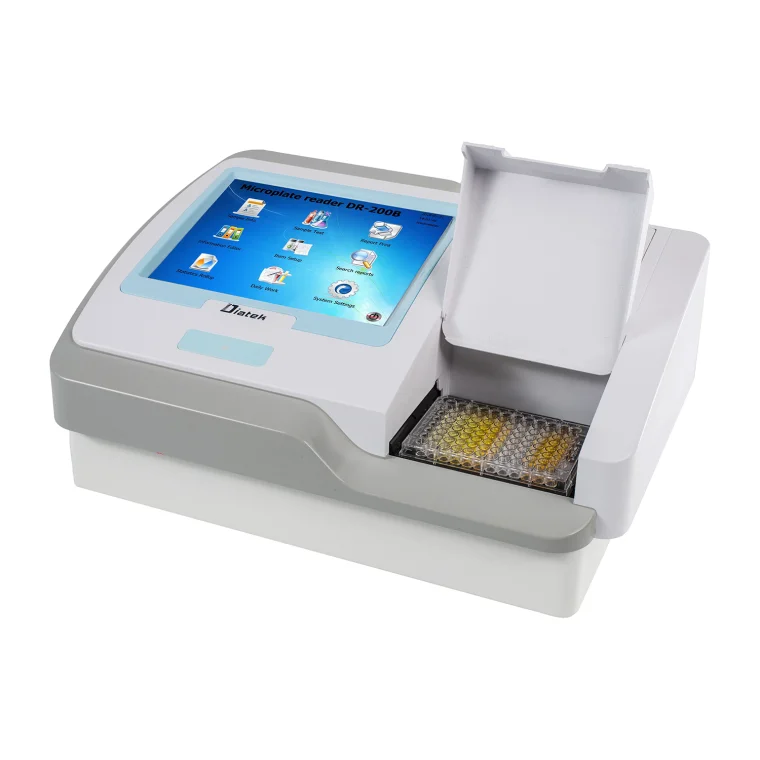- This topic is empty.
-
AuthorPosts
-
2025-09-18 at 5:07 pm #7319
Enzyme-Linked Immunosorbent Assay (ELISA) is one of the most widely used diagnostic and research tools in modern laboratories. From clinical diagnostics to veterinary testing and scientific research, the accuracy and efficiency of ELISA results rely heavily on the quality of equipment. One of the most important instruments in this process is the ELISA reader, also known as a microplate reader. Among the most common configurations are 96 well and 48 well ELISA readers, both of which offer unique advantages depending on laboratory needs.
Diatek, a global professional supplier of IVD (in vitro diagnostic) equipment and related software, is dedicated to the R&D, manufacturing, sales, and service of high-quality ELISA microplate readers and washers. With products widely used in hospitals, clinics, disease control centers, blood banks, research laboratories, and veterinary clinics, Diatek provides advanced solutions that combine precision, reliability, and innovation.

What Is a 96 / 48 Well ELISA Reader?
An ELISA reader is an optical instrument designed to measure the absorbance of samples placed in microplates during ELISA testing. Depending on the laboratory’s testing throughput, readers typically accommodate 96 wells or 48 wells, representing the number of sample wells on the microplate.
-
96 Well ELISA Reader: The industry standard for high-throughput testing, capable of analyzing a large number of samples simultaneously.
-
48 Well ELISA Reader: Ideal for smaller labs, veterinary applications, or research studies with lower sample volumes, offering the same accuracy but with reduced scale.
Both types ensure consistency, speed, and accuracy, making them indispensable in modern diagnostics.
Key Features of 96 / 48 Well ELISA Readers
When evaluating ELISA readers, certain features stand out as essential:
-
High Measurement Accuracy – Ensures reliable results with minimal error.
-
Multiple Wavelength Options – Supports different assays and test kits.
-
User-Friendly Software – Data analysis and reporting become faster and more intuitive.
-
Compact and Ergonomic Design – Saves valuable laboratory space while maintaining robust functionality.
-
Flexible Well Formats – Ability to work with both 96 and 48 well plates for maximum adaptability.
Diatek’s ELISA readers are engineered with these features in mind, supporting a wide range of testing requirements while ensuring compliance with international quality standards.
Functions of ELISA Readers
The primary function of an ELISA reader is to measure optical density (OD) values from ELISA plates. However, modern ELISA readers also provide advanced functions, including:
-
Quantitative and Qualitative Analysis
-
Kinetic and End-Point Measurements
-
Curve Fitting and Data Storage
-
Integration with ELISA Plate Washers for Workflow Automation
By streamlining the workflow, these instruments help laboratories improve efficiency and reduce manual errors.
Applications of 96 / 48 Well ELISA Readers
ELISA readers are widely used across various fields, including:
-
Clinical Diagnostics: For detecting infectious diseases, hormones, and autoimmune markers.
-
Research Laboratories: To study proteins, antigens, and antibodies in biomedical research.
-
Blood Banks: For screening donated blood for pathogens.
-
Veterinary Clinics: For diagnosing animal diseases and monitoring health conditions.
-
Public Health and Disease Control Centers: To support large-scale screening and epidemiological studies.
Diatek’s instruments are trusted by professionals worldwide to deliver accurate and reproducible results in these critical applications.
Why Choose Diatek ELISA Readers?
With decades of expertise, Diatek has become a leading name in IVD equipment solutions, offering a balance of advanced technology, durability, and customer support. Their ELISA microplate readers and washers are designed to meet the evolving needs of modern laboratories while maintaining affordability and user-friendly operation.
By choosing Diatek, laboratories gain access to:
-
High-performance ELISA equipment with global recognition.
-
Comprehensive support for installation, training, and after-sales service.
-
Customizable solutions to meet specific diagnostic or research requirements.
Conclusion
The choice between a 96 well and 48 well ELISA reader depends on the laboratory’s throughput, testing requirements, and budget. Both configurations deliver accurate, efficient, and reliable results, making them essential for clinical, research, and veterinary applications. With companies like Diatek leading the way in innovation and service, laboratories can confidently rely on ELISA readers to support critical diagnostic and research activities.
For labs seeking a trusted partner in ELISA solutions, Diatek provides advanced technology and one-stop service, ensuring that your diagnostic processes remain accurate, efficient, and future-ready.
http://www.hiwelldiatek.com
Wuxi Huawei Diatek Instrument Co., Ltd. -
-
AuthorPosts
- You must be logged in to reply to this topic.
